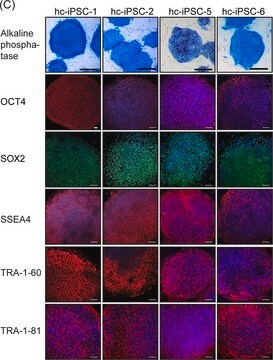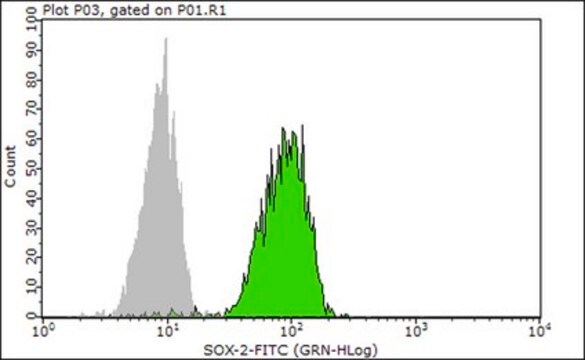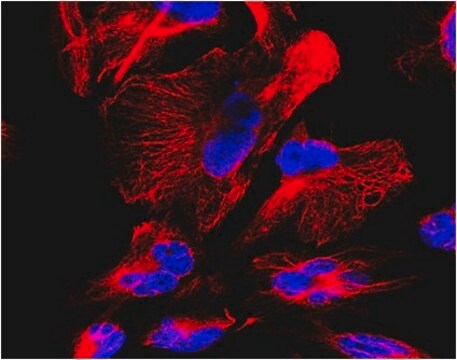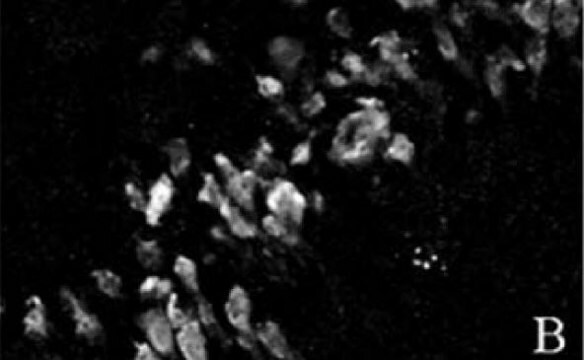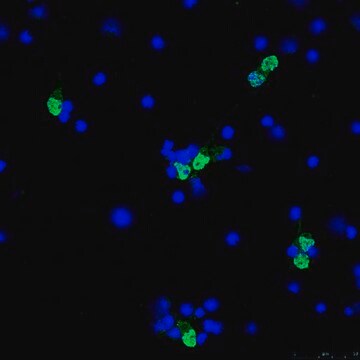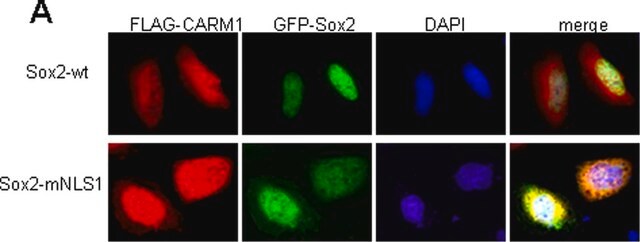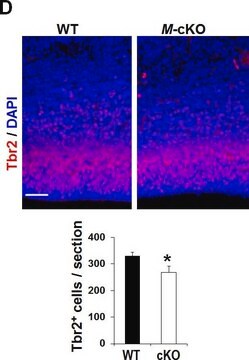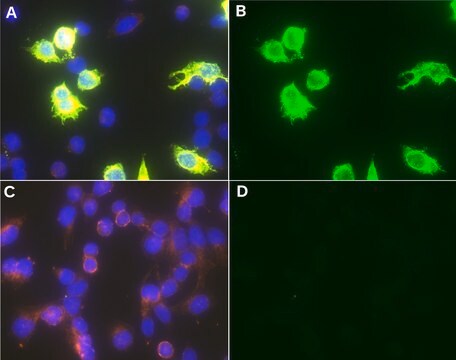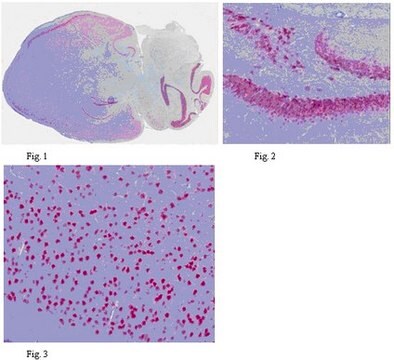추천 제품
생물학적 소스
rabbit
Quality Level
결합
ALEXA FLUOR™ 488
항체 형태
affinity isolated antibody
항체 생산 유형
primary antibodies
클론
polyclonal
종 반응성
human
종 반응성(상동성에 의해 예측)
mouse (based on 100% sequence homology), rat (based on 100% sequence homology)
제조업체/상표
Milli-Mark®
기술
flow cytometry: suitable
동형
IgG
NCBI 수납 번호
UniProt 수납 번호
배송 상태
wet ice
타겟 번역 후 변형
unmodified
유전자 정보
human ... NANOG(79923)
일반 설명
NANOG is a gene expressed in embryonic stem cells (ESCs) and is thought to be a key factor in maintaining pluripotency. NANOG thought to function in concert with other factors such as POU5F1 and SOX2 to establish ESC identity. These cells offer an important area of study because of their ability to maintain pluripotency, i.e., these cells have the ability to become virtually any cell of any of the three germ layers (endoderm, ectoderm, mesoderm).
NANOG may be useful in the immunohistochemical diagnosis of tumors. NANOG is expressed in germ cells of the fetus and in some germ cell tumors of the gonads and central nervous system (CNS).
NANOG may be useful in the immunohistochemical diagnosis of tumors. NANOG is expressed in germ cells of the fetus and in some germ cell tumors of the gonads and central nervous system (CNS).
특이성
Antibody recognizes NANOG.
면역원
Epitope: N-terminus
Linear peptide from mouse Nanog.
애플리케이션
Milli-Mark Anti-Nanog-Alexa Fluor 488 Antibody, N-terminus is an antibody against Nanog-Alexa Fluor 488 for use in FC.
Research Category
Stem Cell Research
Stem Cell Research
Research Sub Category
Pluripotent & Early Differentiation
Pluripotent & Early Differentiation
품질
Evaluated by flow cytometry using 2102 Ep cells
표적 설명
34 kDa Calculated
물리적 형태
Antigen Affinity Purified
Purified rabbit polyclonal IgG conjugated to Alexa Fluor™ 488 in PBS with 0.1% sodium azide and 15 mg/mL BSA
저장 및 안정성
Maintain refrigerated at 2-8 °C protected from light in undiluted aliquots for up to 6 months from date of receipt.
분석 메모
Control
2102 Ep cells
2102 Ep cells
법적 정보
ALEXA FLUOR is a trademark of Life Technologies
MILLI-MARK is a registered trademark of Merck KGaA, Darmstadt, Germany
면책조항
Unless otherwise stated in our catalog or other company documentation accompanying the product(s), our products are intended for research use only and are not to be used for any other purpose, which includes but is not limited to, unauthorized commercial uses, in vitro diagnostic uses, ex vivo or in vivo therapeutic uses or any type of consumption or application to humans or animals.
적합한 제품을 찾을 수 없으신가요?
당사의 제품 선택기 도구.을(를) 시도해 보세요.
Storage Class Code
12 - Non Combustible Liquids
WGK
WGK 2
Flash Point (°F)
Not applicable
Flash Point (°C)
Not applicable
시험 성적서(COA)
제품의 로트/배치 번호를 입력하여 시험 성적서(COA)을 검색하십시오. 로트 및 배치 번호는 제품 라벨에 있는 ‘로트’ 또는 ‘배치’라는 용어 뒤에서 찾을 수 있습니다.
Rong Li et al.
Stem cell research, 34, 101374-101374 (2019-01-15)
Noonan syndrome with multiple lentigines (NSML), formerly known as LEOPARD Syndrome, is a rare autosomal dominant disorder. Approximately 90% of NSML cases are caused by missense mutations in the PTPN11 gene which encodes the protein tyrosine phosphatase SHP2. A human
Amanda Baskfield et al.
Stem cell research, 37, 101436-101436 (2019-04-23)
Niemann-Pick disease type B (NPB) is a rare autosomal recessive lysosomal storage disease caused by mutations in the SMPD1 gene, which encodes for acid sphingomyelinase. A human induced pluripotent stem cell (iPSC) line was generated from dermal fibroblasts of a
Manisha Pradhan et al.
Stem cell research, 54, 102400-102400 (2021-05-30)
NGLY1 deficiency is a rare disorder caused by mutations in the NGLY1 gene which codes for the highly conserved N-glycanase1 (NGLY1). This enzyme functions in cytosolic deglycosylation of N- linked glycoproteins. An induced pluripotent stem cell (iPSC) line was generated
Wei Huang et al.
Stem cell research, 37, 101427-101427 (2019-04-02)
Mucopolysaccharidosis type III B (MPS IIIB) is a lysosomal storage disorder caused by mutations in the NAGLU gene encoding N-acetylglucosaminidase. Here, we report the generation of a human induced pluripotent stem cell (iPSC) line from dermal fibroblasts of a MPS
Junjie Hong et al.
Stem cell research, 37, 101451-101451 (2019-05-10)
Mucopolysaccharidosis Type II (MPS II), also known as Hunter syndrome, is a rare X-linked genetic disease caused by mutations in the IDS gene encoding iduronate 2-sulfatase (I2S). This is a multisystem disorder with significant variation in symptoms. Here, we document
자사의 과학자팀은 생명 과학, 재료 과학, 화학 합성, 크로마토그래피, 분석 및 기타 많은 영역을 포함한 모든 과학 분야에 경험이 있습니다..
고객지원팀으로 연락바랍니다.